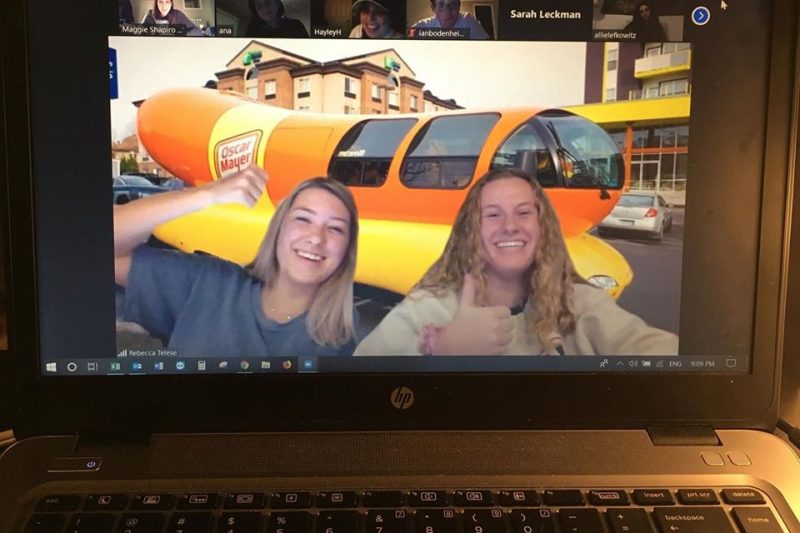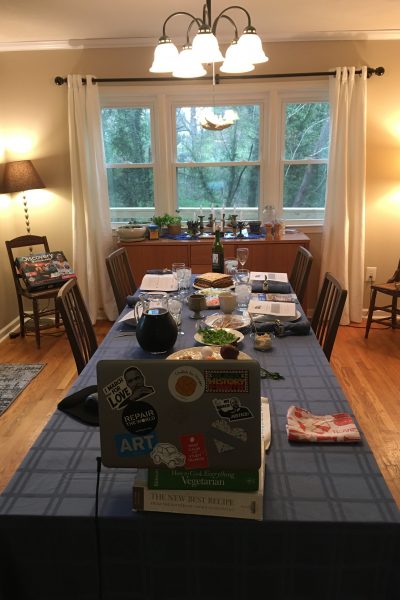Jewish Fellowship Thrives in Virtual Times With help from Hillel International, Director of Jewish Life Maggie Shapiro Haskett has been able to successfully adapt programming to suit the new normal.
When Washington and Lee transitioned to virtual instruction on March 13, Director of Jewish Life Maggie Shapiro Haskett knew that one of her first challenges would be adapting the sense of community, spiritual education and mentorship in W&L’s Hillel community to a virtual format, beginning with her Jewish Learning Fellowship cohort. Luckily for Washington and Lee, she was ready for the challenge.
JLF is a 10-week experiential learning and conversational seminar experience that provides students with the opportunity to explore and deepen their understanding of Judaism. Under normal circumstances, each JLF session is a 90-minute discussion of the week’s assigned text, which can range from 6-10 readings per session. Adapting the sessions to Zoom required keeping meetings to an hour in order to combat Zoom fatigue and scaling back on the number of texts assigned per session. Shapiro Haskett also added structure to sessions in order to keep the conversation flowing.
Shapiro Haskett credits her ongoing partnership with colleagues at Hillel International for helping her adapt. Hillel International’s Office of Innovation quickly developed a set of best practices for taking JLF online, and even offered a special seminar on coping with COVID. Shapiro Haskett was able to spend much of the first week working remotely on her transition to an online format, even managing to keep the class on schedule for their regular Thursday meeting via Zoom.
“Because the OOI team had done so much work to equip us JLF educators for the transition, and because I was already comfortable with Zoom, I felt pretty confident that I was able to competently deliver the content and create the space for students to gather in their JLF community,” Shapiro Haskett says.
“Initially, I was really uncertain how many students would actually make the leap with me to doing JLF online, so I was delighted and more than a little shocked when nearly all of them showed up for our digital gatherings. From the very first online seminar onward, it was heartwarming to hear how much the students valued JLF for the sense of normalcy it offered as well as the dependable and comfortable opportunity to connect with our community.”
Students’ reactions to the JLF experience were overwhelmingly positive in spite of the transition from in-person to virtual. One student commented in program evaluations that “JLF was the first ‘normal’ thing to happen after we left campus. It really made me feel like I was still a part of a community and that things would be OK.”
Like other departments within Student Affairs and across campus, W&L Hillel offered a handful of other one-off virtual programs this spring.
“In the early weeks, it was really anyone’s guess as to what would work,” Shapiro Haskett says. “I tried an online challah baking lesson as well as weekly pre-Shabbat check-ins which were met with modest success. W&L closed shortly before Passover, so we missed out on our traditional seder in Evans Dining Hall. Instead, I set up my laptop in our dining room and welcomed our Jewish students into my family seder via Zoom. With everyone around the table, from my 2-year-old niece in Seattle to all four of my kids’ grandparents, to say nothing of the high school and college students near and far, this was a seder we won’t ever forget. I’ve always loved the way being Hillel director allows me to integrate so many facets of my life, and our seder this year was a great example of that synergy.”
Outgoing Hillel president Lee Bernstein ’20 said the process of going virtual was one of trial and error. “Sometimes, it was only Maggie and I who (virtually) showed up to the event! But I feel that’s okay because you have to figure out what does and doesn’t work.”
Sam Bluestone ’22, Hillel’s incoming president, admitted that the virtual transition was a challenge for everyone. “However,” he said, “I am proud to say that the W&L Hillel community remained incredibly strong and engaged throughout the transition. We were grateful to be able to continue our educational programming as well as implement some new virtual programs for students geared specifically for this new environment. Programming will continue to be a challenge moving forward, but we will always stay true to our purpose to enrich the lives of Jewish students and provide cultural, educational, social, religious, community service and interfaith activities for all students at Washington and Lee University and Virginia Military Institute.”
Shapiro Haskett has been pleased that many W&L students are participating in Hillel@Home programs, Hillel International’s digital platform. Programming has included conversations with authors Brene Brown, Bari Weiss, and Michael Jordan’s business manager Estee Portnoy, as well as conversations about racial justice and diversity within Jewish communities.
“Mobilizing the reach and resources of the Hillel movement to bring truly top-tier programs to all students, regardless of location, is one of the unanticipated gifts of this moment,” Shapiro Haskett says, “and I love that our Hillel can serve as a vehicle for making those connections.”
 An homage to Director of Jewish Life Maggie Shapiro Haskett’s roots in Madison, WI, home of the Weinermobile, roomates Christina Kargol ’20 (l) and Becca Telese ’20 (r) showed up for a virtual JLF session with this delightful Zoom background after W&L suspended on-campus gatherings. “Becca and Christina had a steady rotation of silly backgrounds which helped keep the JLF experience personal and fun,” said Shapiro Haskett.
An homage to Director of Jewish Life Maggie Shapiro Haskett’s roots in Madison, WI, home of the Weinermobile, roomates Christina Kargol ’20 (l) and Becca Telese ’20 (r) showed up for a virtual JLF session with this delightful Zoom background after W&L suspended on-campus gatherings. “Becca and Christina had a steady rotation of silly backgrounds which helped keep the JLF experience personal and fun,” said Shapiro Haskett. Maggie Shapiro Haskett, Director of Jewish Life at W&L, welcomed Jewish students to her family seder via Zoom.
Maggie Shapiro Haskett, Director of Jewish Life at W&L, welcomed Jewish students to her family seder via Zoom.
You must be logged in to post a comment.